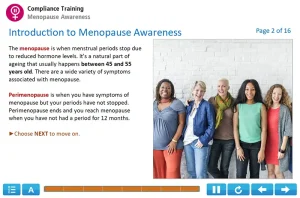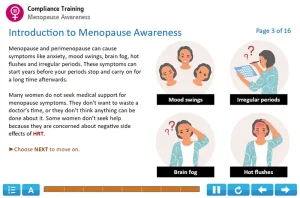About 13 million people are currently perimenopausal or menopausal in the UK. Menopause is a completely natural part of life, yet it can be challenging for some. The symptoms associated with menopause can significantly impact daily living.
Talking about menopause can provide support to those experiencing it – a little bit of menopause awareness can go a long way. If you’re facing symptoms or unsure how to discuss the topic, reaching out to someone you trust can be a great first step toward feeling more understood and supported. This article offers helpful information and advice to assist you.
What is the menopause?
The menopause is when menstrual periods stop and a woman is no longer able to conceive. The NHS has some fantastic introductory information here on their site about menopause.
What is perimenopause?
It is important to understand that menopause doesn’t simply start one day. Perimenopause is the time leading up to menopause when periods are erratic, which can be months or years – it’s different for everyone.
Who is affected by menopause?
The menopause is experienced by anyone with a womb. This, of course, includes women. It also includes trans men, some non-binary people and some intersex people. Trans women may experience menopause symptoms due to fluctuating levels of oestrogen. Men do not experience menopause but can be impacted by menopause in partners and other loved ones.
How do I know if I am in perimenopause?
Perimenopause is when you have symptoms of menopause but your periods have not stopped yet. Your periods may become irregular, more frequent, or heavier. You might also experience bleeding between periods. You might also experience bleeding between periods. Section 1 of our menopause training course covers this topic, including some legal issues individuals and businesses should know.
When does the menopause start?
For most women the menopause happens between the ages of 45 and 55. Menopause from 40 to 44 is termed early menopause and can happen if you started your periods early or have never given birth.
Menopause before the age of 40 it is termed premature menopause. With premature and early menopause, there is an increased risk of osteoporosis and cardiovascular disease. There is also a higher risk of depression, eye disease and underactive thyroid.
What are the signs of menopause?
Most women will experience symptoms during perimenopause, menopause and post-menopause. Some people the symptoms will be mild and manageable. For many the symptoms will cause discomfort and for some there will be severe problems.
Common symptoms of menopause and perimenopause include:
- changes to your mood (low mood, anxiety, mood swings and low self-esteem)
- problems with memory or concentration (brain fog)
- hot flushes
- difficulty sleeping (night sweats)
- palpitations
- headaches and migraines
- muscle aches and joint pains
- changed body shape and weight gain
- skin changes including dry and itchy skin
- reduced sex drive
- vaginal dryness and pain, itching or discomfort during sex
- recurrent urinary tract infections (UTIs)
- sensitive teeth, painful gums or other mouth problems
There are also mental and emotional symptoms to address. Section 3 of our menopause course covers this – information that can become invaluable in helping you become more alert to the signals someone may be experiencing menopause.
How long do symptoms last?
Everyone is different, while some people only experience the symptoms for a few months, for others they can last for years. Symptoms often change with time, for example hot flushes and night sweats may start reducing in frequency and then you might develop mood swings and increased anxiety.
What signals the end of menopause?
Menopause is said to be complete when menstrual periods have ceased for one continuous year. It is common for symptoms during the entire time of perimenopause and into post-menopause to last about seven years. There are associated symptoms that can act as signals, such as:
- Fewer night sweats or hot flushes
- Improved sleep & mood during the day
- No longer feeling tenderness in the breasts
- Reduced joint pain (due to improved oestrogen levels)
- Reduced hair care (if dryness or loss was a symptom)
- No longer feeling dryness or discomfort in your vagina
Can you get treatment for menopause?

The short answer is YES. Many women do not seek medical support for menopause symptoms. They don’t want to feel like they are wasting a doctor’s time or think nothing can be done about it. Some women don’t seek help because they are concerned about negative side effects theyve heard about Hormone Replacement Therapy (HRT).
Topics 4 & 5 of our menopause awareness course cover this in detail, alongside some of the lifestyle changes someone can make during menopause, along with relaxation techniques.
What is the safest medication for menopause and perimenopause?
HRT is a safe and effective treatment for most going through menopause and perimenopause. Speak to your GP about HRT and they will discuss any risks with you.
HRT comes in many forms:
- skin patches
- a gel or spray
- implants
- tablets
You will also need to take progesterone (if you have a womb) to protect your womb lining from the effects of oestrogen. Taking oestrogen and progesterone is called combined HRT.
Looking to raise Menopause Awareness?
If you are looking to raise awareness of the menopause within your team, then look no further.
Our CPD-certified online Menopause Awareness training explains what the menopause is and what the signs and symptoms are. You’ll learn about a range of treatments available and explore how an organisation can support staff who are experiencing menopause. The course can turn what is sometimes viewed as a stigma into something that positively impacts internal policies and staff wellbeing.
For discounts or demos, contact our friendly support team support@i2comply.com.





